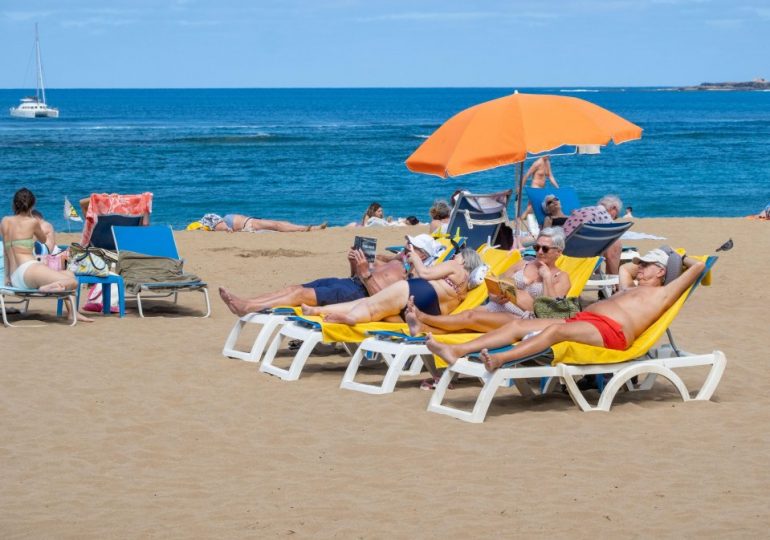BRITISH expats living in Tenerife have blamed the overtourism plaguing the Canary Islands on greedy landlords and bad bosses.
A disgruntled wave of furious locals have been calling for ‘low-quality’ tourists to stop flocking down to the Spanish paradises in recent weeks with some even proposing new laws and taxes to ban Brits.
Alamy‘Low-quality’ Brits have been accused of plaguing the Canary Islands[/caption]
AlamyLocals have become fed up with UK holidaymakers who only come for the cheap beer, burgers and sunbathing[/caption]
EPAHordes of locals have been campaigning against Brits coming to their islands in recent weeks[/caption]
For the Brits living abroad, they are now fearing holidaymakers might decide to avoid the Canary Islands all together after the protests.
Bar owner John Parkes, 43, is originally from Oldham but has lived in Tenerife ever since he was a seven- year-old.
Parkes is well aware his booming bar business relies on the generosity of boozy Brits on their holidays so is against the idea of complaining about the tourists who are just having a good time.
From those who Parkes speaks to, the issues all stem from a lack of affordable housing in the Canaries after it was revealed the price of a one-bedroom apartment has doubled in the past few years.
But the barman lays the blame on a lack of developments being built and a rise in the number of landlords using Airbnbs in the island – not the sun loving expats.
He said: “All the long-term accommodation got taken off the market and replaced with tourist apartments.
“No one can afford to live where they work anymore so everyone gets pushed out of town.”
Parkes said most of the anger comes from the cost of living soaring in the Canaries – and no wage increase to match.
Seven or 14 night stays are still pretty affordable as a yearly treat for holiday seekers.
However, the prices have become unaffordable 365-days-a-year for the average local.
The 43-year-old also commented on how it is affecting local businesses, with many unable to hire staff due to the housing crisis.
“We have other staff who come over from mainland Spain and they just can’t get anywhere to live so they give up and go back,” he told the Manchester Evening News.
Some expats say they have been left “frustrated” at how they think the protests are being seen in the UK.
Jimmy Largey, from Blackley, owns a holiday let in Tenerife and supports the protesters but also feels Brits aren’t to blame.
Largey said: “The problem is not the English holidaymakers or any other for that matter. The problem is the greedy apartment and villa owners.
“The owners are giving notice to the workers and turning their apartments and villas into holiday lets for one purpose – more money.
“Bars, restaurants and hotels are crying out for staff but the staff can’t find affordable accommodation so they are leaving the island.”
Last weekend, thousands of people took to the streets in Tenerife to demand restrictions on holidaymakers after telling Brits to “go home”.
More than 15,000 anti-tourist hordes filled Santa Cruz, brandishing banners including some that translated to “you enjoy we suffer” in English.
Mass protests have continued throughout the week with some reading “where is the money from tourism?” and “‘tourist moratorium now”.
The marches were organised under the slogan “The Canary Islands have a limit.”
CANARY WOES
Protests also took place at the same time in other popular Canary Islands including Lanzarote and Gran Canaria.
Cafe owner Anthony Caitucoli says Lanzorote is facing similar issues with housing but also much further beyond just that.
He called on the government to fix the issues instead of allowing British tourists to take all of the blame.
Caitucoli said: “There’s a shortage of homes for workers and those available are expensive to rent.
“There are also issues such as sewage from hotels and apartments being pumped into the sea.
“These issues need a solution but that solution is not banning tourists or making it harder for them to visit the Canary Islands.
“We need more investment from the government in infrastructure and housing and perhaps setting a daily limit of visitors at our main tourist attractions and natural parks.”
Suzanne Goodwin, 53, moved to Lanzarote last year after being a regular tourist for the past 25 years.
Her main concerns are with how the protests are coming across to Brits thinking about holidaying or even moving in like she did.
Why is Tenerife protesting against Brits?
RESIDENTS of the largest Canary Island seem to be at war with UK holidaymakers as they blast visitors with anti-tourism graffiti and emerging local campaigns.
Locals have been fuming that they are “fed-up” with “low quality” Brit tourists who only come for the cheap beer, burgers and sunbathing.
Now, they are demanding a tourist tax, fewer flights to the island and a clampdown on foreigners buying houses.
Some protesters are claiming that their anger is directed at the government rather than tourists as they ask for change.
They claim that AirBnBs and other holiday rentals are driving up the cost of living and that they are sick of the noise, traffic and rubbish that accompany the avalanche of vacationers that visit every year.
Jaime Coello, president of the Telesforo Bravo Foundation, said: “The quality of the tourist product is being destroyed by the investors and the regional government.”
Waves of anti-tourist graffiti that has been sprayed across the island to tell Brits they are not welcome.
Bitter messages outside tourism hotspots read “your paradise, our misery” and “tourists go home”.
“Locals are forced to move out and YOU are responsible for that,” said a furious printed sign.
Another read: “Tourists go home!”
The brewing chaos coupled with hatred for visitors is now scaring Brit tourists to go on a vacation in Tenerife.
And Jorge Marichal, a hotel chain boss in Tenerife, revealed that Brits were ringing up out of fear they would not be safe on their holidays to the island.
He said: “One of the problems I am facing is that clients are beginning to call and ask what’s happening here and whether it’s safe.”
While the hotel owner said he understands the pain of local people, he added that being “anti-tourist” is not the way to go in.
She said: “I’m not sure they are going about it the right way. The way it’s coming across in the news is that it’s against the tourists.
“They are not against the people, it’s aimed at the government. Tourists are welcome here.
“Everyone is friendly. I’ve never had any hostility. Without the tourists, it wouldn’t survive.”
An angry anti-tourist movement has been gaining momentum throughout the popular holiday hotspot islands in recent months.
Politicians are under immense pressure after tens of thousands of angry residents took to the streets to rage against the tourism industry in the country.
President of the Canary Islands, Fernando Clavijo, previously warned that a daily cost for visitors could be on the table.
While not included in current plans, Clavijo said the government is willing to look at suggestions of a €3 per night charge.
And just days ago, Rosa Dávila, the first female president of Tenerife, proposed a new tourism model that would charge visitors a fee to access natural spaces.
ReutersA girl displays a sign that reads “my island, my future” during a demonstration for a change in the tourism model in the Canary Islands[/caption]
APPeople march during a mass demonstration against tourism affecting local housing in Tenerife, with a banner that reads ‘Canary Islands have limits’, ‘For a change of model’[/caption]
GettyAnother banner being held by a woman reads: “Where do I live?”[/caption]
She also proposed measures to “modulate” the number of tourists arriving in Tenerife – and “study the impact of demographic growth”.
She said after the mass protests: “We must analyze the exceptionalities that can be applied in a territory as fragile and limited as ours. What is clear is that Tenerife cannot be a theme park.
“Those who visit us have to value and respect our natural and cultural wealth, our resources, and they have to be clear about the rules for their preservation.
“In addition, there have to be limits to prevent tourism from overflowing.”
Demonstrators are also looking for more protection from mass tourism – to help with the local environment, traffic and housing issues.
Other demands include the protection of natural spaces, a tourist tax and better working conditions for hotel cleaners, who joined today’s protest in Santa Cruz as they insisted to the local press: “We are not slaves.”
Organisers claim the march hit up to 50,000 participators.
Six more campaigners are still on hunger strike – and public sit-ins are still being organised to support them, the DailyMail reports.
TOURIST TRAP
A RISING number of visitors in idyllic holiday hotspots is forcing out locals.
Important amenities such as post offices and village shops are being disposed of to make way for more houses and cafes for tourists.
Locals are also struggling to climb on the property ladder as many houses sit empty, being used as second homes and holiday lets.
In some hotspots this has created a major housing crisis as demand for accommodation and second homes drives house prices sky high.
Road infrastructure and parking systems often can’t cope with more tourists – leading to traffic chaos and safety concerns.
GettyThousands of Spanish locals have taken to the streets of Tenerife in recent weeks[/caption]
ReutersPeople gather during a demonstration for a change in the tourism model[/caption]
GettyExpats fear the protest could put off Brits from visiting the Spanish islands[/caption]
Leave a comment








